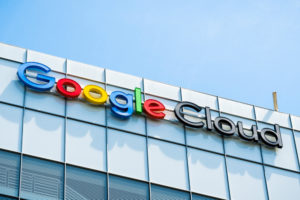

(Pasko Maksim/Shutterstock)
At its Next ‘22 event, Google Cloud announced the launch of an open source machine learning compiler ecosystem, OpenXLA.
OpenXLA is a community-led and open source ecosystem of ML compiler and infrastructure projects co-developed by Google and other AI/ML developers including AMD, Arm, Meta, NVIDIA, AWS, Intel, and Apple.
Incompatibilities between frameworks and hardware can impede ML development, and OpenXLA aims to address this by giving flexibility to developers when it comes to the frameworks and hardware they choose for ML projects.
According to the OpenXLA project charter, the objective of the project is to enable efficient lowering, optimization, and deployment of ML models from most major frameworks, such as PyTorch and TensorFlow, to any hardware backend (notably CPUs, GPUs, and ML ASICs) through collaborative work with major ML frameworks and hardware vendors.
 In a blog post, Sachin Gupta, Google VP and GM of infrastructure, explains that the first objective for the new community project will be a collaborative evolution of the XLA compiler, a compiler that was developed to streamline modeling in TensorFlow through speeding up the training process and reducing overall memory consumption. The compiler is now being decoupled from TensorFlow, and OpenXLA will work to build StableHLO, a portable ML compute operation set which acts as a portability layer between machine-learning frameworks and compilers.
In a blog post, Sachin Gupta, Google VP and GM of infrastructure, explains that the first objective for the new community project will be a collaborative evolution of the XLA compiler, a compiler that was developed to streamline modeling in TensorFlow through speeding up the training process and reducing overall memory consumption. The compiler is now being decoupled from TensorFlow, and OpenXLA will work to build StableHLO, a portable ML compute operation set which acts as a portability layer between machine-learning frameworks and compilers.
OpenXLA’s goals are listed as the following:
- Accelerate industry collaboration around XLA and build a vibrant OSS community.
- Share and receive feedback on the technical direction for OpenXLA and ensure it meets the needs of major users and contributors.
- Set up a new XLA repository or organization with independent build/test, with infra to more easily accept PRs, and that is hardware and framework independent.
- Ensure the extraction of XLA from TensorFlow is minimally disruptive to existing users and contributors.
- Create a product identity with its own brand, website, docs, and communication channels.
- Discuss establishment of governance outside TensorFlow.
 “At Google, we believe open-source software is essential to overcoming the challenges associated with inflexible strategies. And as the leading Cloud Native Computing Foundation contributor, we have over two decades of experience working with the community to turn OSS projects into accessible, transparent catalysts for technological advance. We’re committed to open ecosystems of all kinds, and this commitment extends to AI/ML—we firmly believe no single company should own AI/ML innovation,” said Gupta.
“At Google, we believe open-source software is essential to overcoming the challenges associated with inflexible strategies. And as the leading Cloud Native Computing Foundation contributor, we have over two decades of experience working with the community to turn OSS projects into accessible, transparent catalysts for technological advance. We’re committed to open ecosystems of all kinds, and this commitment extends to AI/ML—we firmly believe no single company should own AI/ML innovation,” said Gupta.
Membership in OpenXLA is open to everyone involved in developing or integrating with XLA, including representatives of ML frameworks, hardware platforms, users, and integrators. To participate, members can request an invitation to join the GitHub organization and SIG Discord, to be announced at a later date.
Related Items:
Databricks Announces Major Contributions to Flagship Open Source Projects
AMD Joins New PyTorch Foundation as Founding Member
Open Data Hub: A Meta Project for AI/ML Work
July 1, 2025
- HighByte Releases Industrial MCP Server for Agentic AI
- Qlik Releases Trust Score for AI in Qlik Talend Cloud
- Dresner Advisory Publishes 2025 Wisdom of Crowds Enterprise Performance Management Market Study
- Precisely Accelerates Location-Aware AI with Model Context Protocol
- MongoDB Announces Commitment to Achieve FedRAMP High and Impact Level 5 Authorizations
June 30, 2025
- Campfire Raises $35 Million Series A Led by Accel to Build the Next-Generation AI-Driven ERP
- Intel Xeon 6 Slashes Power Consumption for Nokia Core Network Customers
- Equal Opportunity Ventures Leads Investment in Manta AI to Redefine the Future of Data Science
- Tracer Protect for ChatGPT to Combat Rising Enterprise Brand Threats from AI Chatbots
June 27, 2025
- EarthDaily Ignites a New Era in Earth Observation with Landmark Satellite Launch
- Domo Deepens Collaboration with Snowflake to Accelerate AI-Driven Analytics and Data Integration on the AI Data Cloud
- AIwire Launches Annual People to Watch Program
June 26, 2025
- Thomson Reuters: Firms with AI Strategies Twice as Likely to See AI-driven Revenue Growth
- DataBahn Raises $17M Series A to Advance AI-Native Data Pipeline Platform
- BCG Report: Companies Must Go Beyond AI Adoption to Realize Its Full Potential
- H2O.ai Breaks New World Record for Most Accurate Agentic AI for Generalized Assistants
- Foresight Raises $5.5M Seed Round to Bring Unified Data and AI to the Private Market
- Treasure Data Launches MCP Server: Let Your LLM Talk to Your Data
- Fujitsu Strengthens Global Consulting with Focus on AI, Data, and Sustainability
- HPE Expands ProLiant Gen12 with New AMD Servers
- Inside the Chargeback System That Made Harvard’s Storage Sustainable
- What Are Reasoning Models and Why You Should Care
- Databricks Takes Top Spot in Gartner DSML Platform Report
- Snowflake Widens Analytics and AI Reach at Summit 25
- Why Snowflake Bought Crunchy Data
- Change to Apache Iceberg Could Streamline Queries, Open Data
- The Evolution of Time-Series Models: AI Leading a New Forecasting Era
- Top-Down or Bottom-Up Data Model Design: Which is Best?
- Agentic AI Orchestration Layer Should be Independent, Dataiku CEO Says
- LinkedIn Introduces Northguard, Its Replacement for Kafka
- More Features…
- Mathematica Helps Crack Zodiac Killer’s Code
- AI Agents To Drive Scientific Discovery Within a Year, Altman Predicts
- Solidigm Celebrates World’s Largest SSD with ‘122 Day’
- ‘The Relational Model Always Wins,’ RelationalAI CEO Says
- Confluent Says ‘Au Revoir’ to Zookeeper with Launch of Confluent Platform 8.0
- DuckLake Makes a Splash in the Lakehouse Stack – But Can It Break Through?
- Supabase’s $200M Raise Signals Big Ambitions
- The Top Five Data Labeling Firms According to Everest Group
- Data Prep Still Dominates Data Scientists’ Time, Survey Finds
- Toloka Expands Data Labeling Service
- More News In Brief…
- Astronomer Unveils New Capabilities in Astro to Streamline Enterprise Data Orchestration
- Astronomer Introduces Astro Observe to Provide Unified Full-Stack Data Orchestration and Observability
- BigID Reports Majority of Enterprises Lack AI Risk Visibility in 2025
- Databricks Unveils Databricks One: A New Way to Bring AI to Every Corner of the Business
- Snowflake Openflow Unlocks Full Data Interoperability, Accelerating Data Movement for AI Innovation
- Seagate Unveils IronWolf Pro 24TB Hard Drive for SMBs and Enterprises
- Gartner Predicts 40% of Generative AI Solutions Will Be Multimodal By 2027
- Databricks Donates Declarative Pipelines to Apache Spark Open Source Project
- Code.org, in Partnership with Amazon, Launches New AI Curriculum for Grades 8-12
- Zscaler Unveils Business Insights with Advanced Analytics for Smarter SaaS Spend and Resource Allocation
- More This Just In…


























